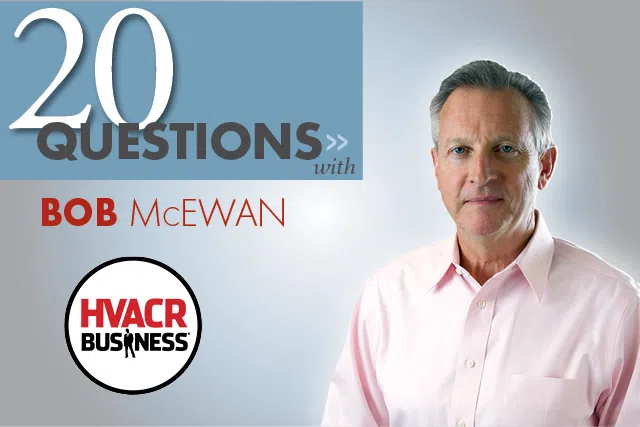The smallest acts can have the most impact when building relationships with your employees.
Consider this hypothetical scenario: Samuel had recently taken a position as operation manager with a large HVACR company. Sam's confidence in his leadership was still shaken after failing to keep his father's HVACR business running while he dealt with a terminal illness. This new position had taken off to a slow start.
Although he knew he needed to establish trust and build credibility with his team, nothing seemed to work. Six months into it, he still sensed suspicion and guardedness whenever he rode along with the technicians or installers. Business was down and he was not making much headway. Finally, he turned to a trusted member of his team for advice and was dumfounded by the response: Change your license plates!
What?
Every day your co-workers come in and see your car in the lot with our areas biggest football rival's decal on your license plates. They see that and think of you as their rival too. If you want to prove you're on their team, change your plates.
In this scenario, Samuel learns a very small but valuable lesson when leading people: often it is the smallest things that make the biggest difference. It's called little leadership. It is simple in concept, easy to do and can be especially helpful when times are tough and resources are scarce. So always be on the lookout for the next 'small idea.' With a little forethought and a little effort you can reap big results. Below are some tips and ideas to get you started in making little leadership work for you.
A Sweet Idea
Placing a snack or vending machine nearby makes visiting your workspace a treat. Even a candy dish on your desk will do. Dropping by for their favorite morsel, people will associate you with those small breaks that help them get through the day, and you'll be amazed at the comments you'll overhear that will help you keep your finger on the pulse of morale and office politics.
Face Time
Sticking your head in someone's office or dropping by their cubicle to say thanks in person is a very small investment of time that pays big dividends as long as you are sincere and don't overplay your hand. When someone does a particularly good job, don't just make a mental note of it, tell him or her in person. The recipient of your goodwill will feel valued and appreciated for what they do and will be more motivated to keep it up.
Remove Subtle Signs
Audit your work place for any subtle practices that divide people based on rank and privilege for no good reason. For example, in the majority of cases, I can't think of any good reason for preferred parking for executives. All it does is serve to reinforce the gulf between employees and management. It unnecessarily contributes to a sense of us versus them. If such perks really matter to your executives, you've got the wrong people in positions of power.
Hand Written Notes
Notes can be powerful tools for building relationships. In this electronic age, hand written correspondence has gone by the boards in favor of e-mail, voicemail and the like. And, for convenience, that's mostly a good thing. But if you want to stand out from the crowd, take the time to write a short, handwritten note to express gratitude or appreciation toward your best customers, clients or prospects. This small gesture will go a long way toward saying 'you matter to me,' and it leaves a very strong impression.
Ask 'How Are You Doing?' and Mean It
When times are tough and people are stressed, taking the time to genuinely inquire into how someone is doing sends a powerful message of caring. We're not talking a spill-your-gut session here or in-depth psychotherapy, but taking a minute or two to inquire after a co-worker's sick child or parent, or to see how the job is progressing, let's people know you care. As a consequence, they are more likely to care about you and the business.
Small Celebrations
I'm not a big fan of throwing a birthday party every five minutes, but if your group has been working extra hard, plan something small but fun as a reward. Bringing in bagels for breakfast,pizza for lunch, ice cream for a late afternoon break, or maybe a Friday night movie for everyone in the group and their dates are just a few easy and low-cost ways to celebrate success and the hard work it takes to make it happen.
Nothing is Too Small
If it matters to them, it should matter to you. Let's go back to the birthday party situation. If you have a group that likes to celebrate small things like birthdays but you could care less, find a way to support them. Remember the essence and premise of little leadership: with people, the little things are the big things. Rather than discounting others' wishes because they do not matter to you, ask people for suggestions on how to accomplish their wishes so work still gets done and everyone wins. Taking little steps like these helps to sustain morale and builds your leadership brand and power.
Don't Assume You Know What Matters
It's not unusual for several generations to be working side by side, and it's common for the leader to be significantly older than the youngest cohort. Don't assume that what matters to you matters to them. Find out what seemingly small things are important to all of your colleagues, and try to provide for them as much as possible. This does not mean you need to compromise your values or lower performance expectations. Is does mean you need to work extra hard to make sure you understand what drives the behaviors of everyone, especially those different from you.
Think 'Short And Small' to Hit it Big
When attending educational events, make it your goal to walk away with a short list of just one or two main ideas to focus on going forward. Then, at the beginning of each week, choose one small thing you can do that will make a difference in that area. Over time, those small weekly shifts in behavior will make a big difference in getting the results you seek.
A Final Word
If little leadership sounds like common sense, that's because it is. But all too often, it's not common practice. Leaders spend so much time in pursuit of the next 'big idea' that they miss the scores of little ones right in front of them that can have an immediate and lasting impact. So the next time you start thinking about how to improve things at work, think small. The results you'll get may be huge.





